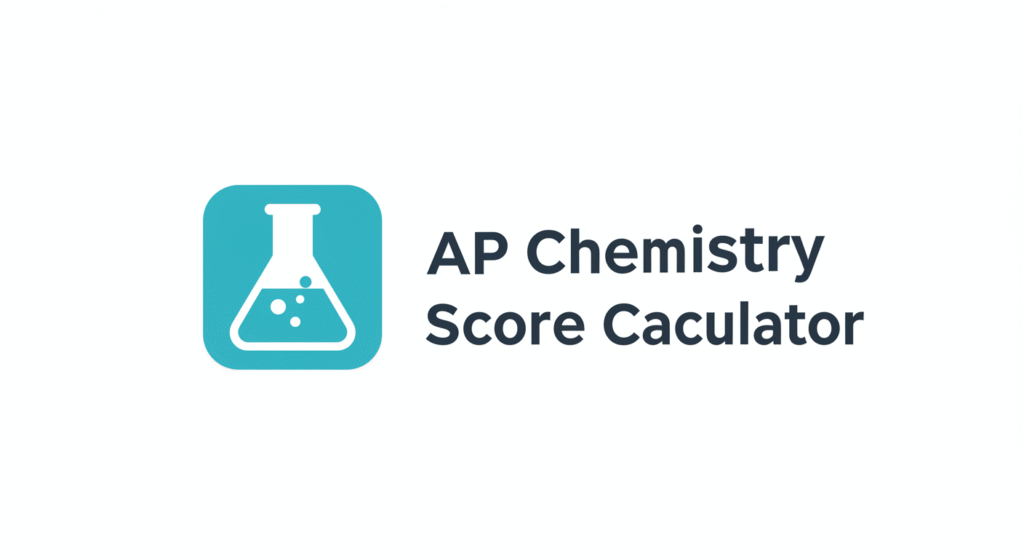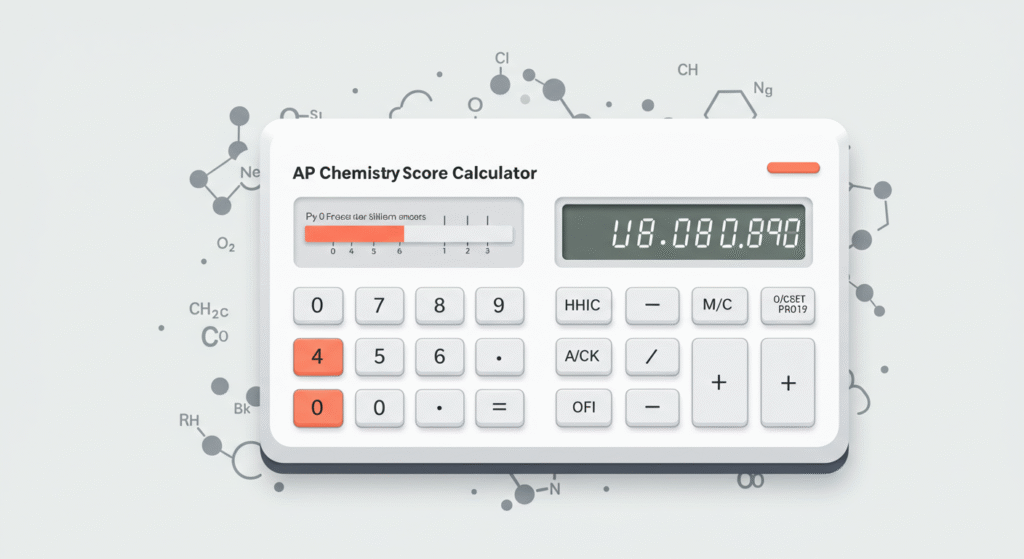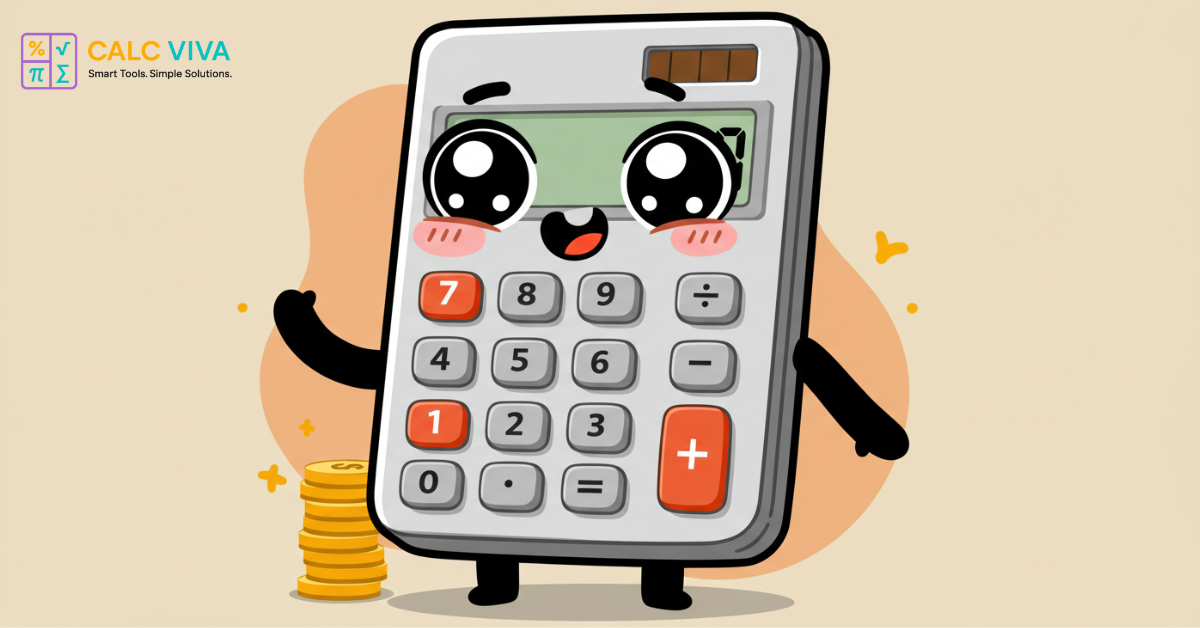- Home
- About
- Blog
- Categories
- Calculators
- Blooket Calculator
- Cinder Block Calculator
- Tattoo Cost Calculator
- Cock Size Calculator
- Angel Number Calculator
- Ethnicity Percentage Calculator
- Prostate Volume Calculator
- Tree Removal Cost Calculator
- Diamond Dynasty PXP Calculator
- Chipotle Calorie Calculator
- Acres Per Hour Calculator
- Birth Chart Calculator
- Dog Size Calculator
- Elden Ring Weapon Calculator
- Gematria Calculator
- Hidden Power Calculator
- Life Path Calculator
- Pulse Per Mile Calculator
- Starbucks Nutrition Calculator
- History of Calculators
AP Chemistry Score Calculator
Quickly estimate your AP Chemistry exam score using this easy-to-use calculator. Input your multiple-choice and free-response scores to get an accurate prediction of your final AP score (1–5). Perfect for test prep and tracking your progress!
AP Chemistry Score Calculator
| Component | Score | Weight |
|---|---|---|
| MCQ | - | 50% |
| FRQ | - | 50% |
| Total | - | 100% |
Recommendations
*Disclaimer: This calculator is an unofficial tool designed for practice and estimation purposes only. It is not affiliated with the College Board, nor does it guarantee your final AP Chemistry score. Always consult official resources and teachers for authoritative guidance.
AP Chemistry Score Calculator by CalcViva
Scoring high on the AP® Chemistry exam can open doors to college credit and academic recognition. With CalcViva’s AP Chemistry Score Calculator, students can now estimate their AP Chem score with precision. Our score predictor uses the latest scoring patterns to help students identify where they stand based on raw input from Multiple Choice Questions (MCQs) and Free Response Questions (FRQs). This tool not only provides a projected AP score from 1 to 5 but also offers a comprehensive breakdown to guide focused study efforts. In this article, we explain how the calculator works, how scores are derived, and tips to maximize your success.
Calculate Your AP Chemistry Score Instantly
Using CalcViva’s AP Chemistry Score Calculator is a fast, effective way to gauge your exam readiness. You simply enter your raw scores from the multiple-choice section and the free-response section. The calculator instantly converts these values into a total composite score and predicts your likely AP score (1 to 5). This kind of automated feedback is critical for identifying performance gaps and strengths.
Many top-ranking AP Chemistry score calculators, including CalcViva’s, are modeled on College Board’s historical conversion tables and scoring rubrics. Our tool helps reduce uncertainty, especially close to exam dates when students are looking for accurate benchmarks to guide final review sessions. Whether you’re scoring low on FRQs or dominating MCQs, our tool lets you balance your strengths and weaknesses.
How the Final AP Score (1–5) Is Determined
The final AP score is not a simple percentage. It results from years of statistical analysis, standard deviation control, and psychometric review by the College Board. The AP Chemistry exam is curved to ensure fairness across different cohorts. So, even if one year’s exam is harder, the score distribution accounts for it.
This is why students with the same raw scores in different years may receive different AP scores. CalcViva stays updated with these shifts and adjusts our calculator accordingly. We also recommend using official College Board sample questions to practice for the most accurate reflection of scoring.

Enter Your Raw Scores Below
Multiple Choice Questions (MCQ) Score
The multiple-choice section includes 60 questions, each worth 1 point. That gives a maximum raw score of 60. On the exam, this section accounts for 50% of your total composite score. With CalcViva, you can input your correct answers directly, and our backend system weighs them accordingly.
For example, if you got 40 questions correct, your raw MCQ score would be 40. This would then contribute 50% of your composite score. By understanding this breakdown, students can strategically focus on boosting this area, especially because MCQs are more predictable than FRQs.
| Correct MCQs | Raw Score | Composite Contribution (50%) |
|---|---|---|
| 30 | 30 | 30 / 60 x 50 = 25 |
| 45 | 45 | 45 / 60 x 50 = 37.5 |
CalcViva’s calculator applies these logic-based calculations in real time, ensuring your output is consistent with AP standards.
Free Response Questions (FRQ) Score
The FRQ section comprises 7 questions: 3 long and 4 short. These questions assess deeper understanding, lab applications, and mathematical reasoning. This section also counts for 50% of your final score.
Each FRQ is graded on a point scale, usually ranging between 4 to 10 points. The total raw FRQ score is out of 60. Just like MCQs, CalcViva’s calculator processes your FRQ score input and calculates its weight toward your composite score.
| Question Type | Points per Question | Total Points |
| Long FRQs (3) | ~10 each | 30 |
| Short FRQs (4) | ~7.5 each | 30 |
| Total | 60 |
By entering your estimated or practice test scores, you can see how strong your FRQ section is and identify areas needing deeper revision.
Your Total Composite Score
The total composite score is the sum of your weighted MCQ and FRQ scores. This number is critical because it determines your final AP score on the 1–5 scale. For example, if your MCQ score contributed 35 points and your FRQ score contributed 40, your composite would be 75.
This composite score then maps to the AP scoring thresholds. CalcViva uses these thresholds based on recent College Board data and exam trends to predict your score. The total composite score is always out of 100, evenly split between MCQ and FRQ. Accurate estimation here allows you to realistically understand your exam position and make data-driven adjustments.
Your Predicted AP® Exam Score
The AP score ranges from 1 to 5. Here’s a general idea of how raw composite scores typically translate:
| AP Score | Composite Score Range |
| 5 | 72–100 |
| 4 | 60–71 |
| 3 | 45–59 |
| 2 | 30–44 |
| 1 | 0–29 |
CalcViva’s AP Chemistry Score Calculator applies this mapping to give you an accurate score prediction. While exact cutoffs may change year to year, this structure remains consistent. A predicted 5 means you’re well-prepared for the exam and likely to earn college credit. A lower score helps identify the need for more study or strategy changes.
How the AP Chemistry Score Is Calculated
Step-by-Step AP® Chem Scoring Process
The AP Chemistry scoring process involves converting raw section scores into a composite, then scaling that to a final AP score. Here’s how it works:
Raw Scores: Your number of correct answers in MCQs and your earned points in FRQs.
Weighting: Both sections contribute 50% of your final score.
Composite Score: A score out of 100 that combines both sections.
Scaling: College Board uses psychometric data to map composite scores to a 1–5 scale.
This ensures consistency across different versions of the exam and maintains fairness. CalcViva’s calculator mimics this system by giving you transparency in the scoring logic. Understanding this process allows students to simulate different scoring scenarios and focus on the sections that have the most scoring leverage.
Score Conversion Table (Raw to Scaled)
Score conversions are necessary to adjust for difficulty levels between different exam versions. Here’s a standard conversion table CalcViva uses:
| Composite Score | Scaled AP Score |
| 90–100 | 5 |
| 75–89 | 4 |
| 60–74 | 3 |
| 45–59 | 2 |
| 0–44 | 1 |
While these are estimates, they offer clear insight into how raw performance translates to final scoring outcomes.
Improve Your AP Chemistry Score

Top Study Tips From AP® Experts
Scoring well in AP Chemistry requires more than just memorization. CalcViva’s team suggests focusing on conceptual understanding and practice-based learning. Here are some high-impact strategies:
Use official College Board materials to understand question types.
Master equilibrium, kinetics, thermodynamics, and acid-base reactions.
Study from top prep books like Princeton Review or Barron’s.
Allocate time for both MCQs and FRQs in practice tests.
Our calculator lets you simulate exam performance, and based on those results, you can adjust your study schedule and focus areas.
Common Mistakes and How to Avoid Them
Skipping units: AP Chemistry is cumulative. Skipping topics leads to scoring gaps.
Neglecting FRQs: These test applied knowledge. Practice writing full, clear answers.
Poor time management: Learn to budget your time during both MCQ and FRQ sections.
CalcViva’s calculator shows which area needs improvement, helping you avoid these mistakes through data-driven feedback.
Analyzing Strengths and Weaknesses
After entering your practice scores in the CalcViva tool, analyze the results. If you’re scoring 90% on MCQs but 50% on FRQs, focus your revision on problem-solving, chemical analysis, and lab-based questions. Use timed tests to simulate real pressure and improve pacing.
Targeted Practice for MCQs and FRQs
For MCQs: Focus on reaction rates, atomic structure, and periodic trends.
For FRQs: Practice calculations, equilibrium problems, and lab design.
Using CalcViva’s feedback loop, allocate your study time accordingly. This smart approach ensures you’re not just studying hard, but studying effectively.
Suggestions: Maximize Your AP Chem Success With CalcViva
Using an AP Chemistry Score Calculator like CalcViva’s allows students to take control of their preparation. By entering your raw scores, understanding how scoring works, and applying study strategies to weak areas, you improve your chance of scoring a 4 or 5. Our tool is built on accuracy, simplicity, and educational value. Let CalcViva be your trusted partner in AP Chemistry prep, helping you score smarter and succeed faster.
Frequently Asked Questions
Common questions and answers for your convenience about Act Score Calculator.
Can I Still Score a 5 With Low MCQs or FRQs?
Yes, but it’s difficult. You’d need to perform exceptionally well on one section to compensate. For example, a perfect 60 on FRQs could still net you a 5, even with a low MCQ score.
Is the AP Chem Curve Real?
Yes. Each year’s test is curved to adjust for varying difficulty levels. This ensures score fairness across years and test forms.
How Accurate Is This Score Calculator?
CalcViva’s AP Chemistry Score Calculator is based on publicly available College Board data and tested against released scoring guides. While no third-party calculator can promise 100% accuracy, ours offers a close estimate for practice and planning.


